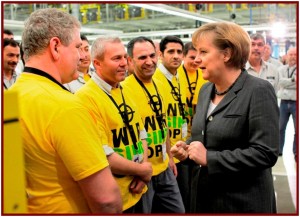
Last year the German government – facing a taxpayer revolt and deficits that foreshadowed the current crisis in Europe, refused to provide €1.1 billion in subsidies that GM wanted for Opel, saying it had enough cash to keep Opel running.
General Motors Vice Chairman Stephen Girsky has been named Chairman of the Supervisory Board, Adam Opel AG, effective immediately. He replaces Nick Reilly, who resigned from the board as a member and chairman. Girsky has served as a member of the Opel Supervisory Board since January 2010.Reilly recently announced his retirement from GM in March 2012. Girsky has served as a member of the Opel Supervisory Board since January 2010. GM Chief Financial Officer Dan Ammann and GM International Operations President Tim Lee have also been newly appointed to the Supervisory Board.
GM Europe (GME) reported a $300 million loss in Q3, almost entirely because of Opel’s ongoing problems. GM at the time said it does not expect to achieve its target to break even before restructuring charges in Europe, “due to deteriorating economic conditions.” GM has lost more than $13 billion at Opel in a stream of red ink that started flowing in the waning years of the 20th century. Results at Opel/Vauxhall and GM Europe are central to GM’s financial success, of course.
The Opel Board, as well as GM’s Board of Directors, has the task of returning GM’s European Operations to sustainable profitability, after years of stopgap measures by previous GM management teams that did not accomplish this. Further cost cutting is needed, which likely means politically contentious plant closures. On a Q3 earnings phone call with reporters earlier this month, CFO Amman said that nothing would be ruled out to return Opel to profitability.
The latest moves come as the economy of Europe remains battered, with auto sales on track to decline for the fourth straight year. During the first nine months of 2011, only 10,121,423 new cars were registered in the region, or 1.1% less than in the same period a year ago. Fiat, the owner of Chrysler, Ford and General Motors are all struggling to keep their European operations viable as all are losing market share.
“GM is committed to Opel and wants the brand to grow in a profitable way. To realize Opel’s full potential, we will continue to optimize its cost structure, improve margins and better leverage GM’s scale,” Girsky said in a statement.
Last year the German government – facing a taxpayer revolt and big deficits that foreshadowed the current debt crisis in Europe, as well as budget turmoil in the United States, refused to provide €1.1 billion in subsidies that GM wanted for Opel, saying the company had enough cash to keep Opel running.
The cash, of course, came from U.S. taxpayers in 2009 when GM was forced into bankruptcy, who along with the United Auto Workers Union own the biggest stakes in GM, which now employs about 24,000 people in a reunited Germany.
There is a large amount of friction between Opel and Chevrolet factions inside GM as both brands compete for the same customers. Chevrolet is increasingly turning to GM’s Korean subsidiary Daewoo as a source for small cars that Opel once designed exclusively. Opel’s future is clearly as a regional European brand in a market where it is struggling.
GM’s global weakness remains a troubling trend since GM is the most international of the Detroit 3. GM’s largest markets are China, followed by the United States, Brazil, the United Kingdom, Germany, Canada, and Italy. Right now GM is a two trick pony as far as earnings are concerned – the U.S. and China; or rather a one trick pony and a one trick dragon. Still, GM in Q3 with earnings of $1.7 billion was the most profitable Detroit automaker, out earning Ford Motor at $1.6 billion and Fiat-controlled Chrysler Group at $228 million.
See also:

